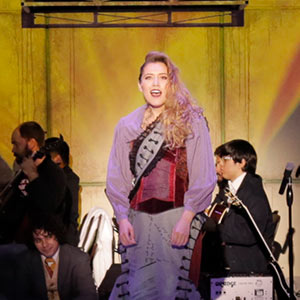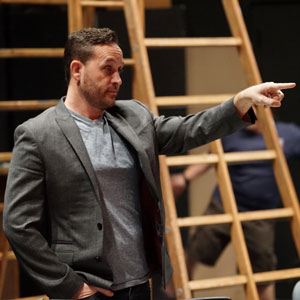Frankenstein lives in steam punk
— Fullerton College Hornet - Delton Valentine - Wednesday, October 20th, 2010Having been claimed as the most technical show for FC in twenty years, William Mittler's Frankenstein adaptation is a fresh, well-stylized production that never reached its full potential for steam punk greatness.
Although the show didn't come off as the unforgettable production it had the potential to be, it still had a distinct originality that was invigorating to watch.
The original work is a retelling of Mary Shelley's gothic novel depicting modern concepts of interracial love and homosexuality. Perhaps the most notable changes from the novel are the setting, which is changed from New York City.
While it still takes place in the time period of the 1800s, bringing the action to New York creates a great effect of proximity and is relatable to the ideas being presented.
The actors in Frankenstein did a decent job of portraying their written personas, however, a few stood out among the rest. Memorable performances came from Daniel Hunt and Tyler McGraw, who played Victor Frankenstein and Henry respectively.
The two actors presented a closeness that felt authentic and an aspect of the characters that was well thought out.
The characters' eventual relationship that is revealed didn't seem forced or contrived, and was presented in a manner that made the underlying tension tangible.
The seething tension between the two men eventually built up into the ultimate moment of a gay kiss before Henry's death. While the kiss is expected within the moment, it does not fail to still shock and provide substance to the relationship that has been hinted at throughout the play. Much of the audience let out an audible gasp and cheers at the men's public affection, but felt it was right for the goodbye between the two.
Also worthy of mention is the interaction - between the Creature, 'commonly referred to as Frankenstein, and the character of Agatha. There's much to be said in the play's depiction of a love unaffected by the time's racism and prejudice. Symbolically, it went to infer that beings without human emotions have the capacity for more compassion and love than the "civilized" people of the city.
The relationship between Agatha and Frankenstein is never consummated and the love becomes unrequited, classically Shakespearean and tragic Though his very innocent interactions with the African American woman allow Frankenstein to finally feel emotions, he sometimes fears they have too much power over him.
Later it only comes as irony when the Creature's ability to truly feel the emotions lead to the death and chaos that fuels the play. Agatha's character, portrayed by the delightful Eileen Farley, could hav&f benefited from a more prominent appearance of darkness.
Considering her circumstances the women would have been more conflicted when showing vulnerability to the Creature.
The rest of the cast had a decent performance, but could have used more time with their characters and making them real people instead of words on a page being recited to an audience.
The music of the production easily pushed the show to a next level. It contributed nicely to the theme and created a more live theatre atmosphere, making the show feel more grand and epic. Frankenstein combines both the use of live instruments and electronic music, courtesy of FC's music program.
The music's best implementation into the show is its use in the ballroom scene. The scene brings to mind the fact the show's costumes were not with as much into the theme as it could have been. But the clothing served their purpose decently.
However, its hard to come to terms that with such a high concept theme when the costumes feel short. The thought of steam punk brings images of heaps of metal, metallics, dark colors features expertly combined with Victorian garb pop into mind.Thoroughly disappointed with wardrobe, it did not distract too much from plot and moving the story forward.
Overall, the adaptation presented the same characters in a rather interesting era of a parallel universe. A universe where the civil war was non existent and religion and race were subjects to be hunted and murdered for. The production of Frankenstein did not live up to expectations, but managed to challenge audiences on a certain intellectual level and tell a sometimes coherent plot with interesting characters.
The main success of William Mittler's Frankenstein is most definitely it's strong character arcs and need to challenge those conflicted people and watch their reactions.
The main purpose of art is to teach and for an audience to learn, which the play does a good job of accomplishing. Its safe to say art doesn't always get it right on the first try, but the script shows huge potential for future attempts to make it greater. Frankenstein declared to Fullerton College that morality is gray and is never exclusive-to humans. And in some cases, the most human things are what we portray or make into monsters.








